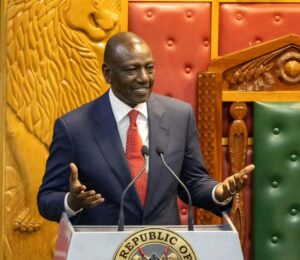Underground Innovation: Busia Man Builds Unique Home to Secure Family’s Future Amid Land Disputes
By Sofia Jerotich
In a remarkable twist on traditional housing, 30-year-old Kevin Ochieng has constructed an underground house, turning a dream into a reality while addressing the pressing issues of land ownership and family safety. Living in a country where land disputes often lead to significant social challenges, Ochieng’s innovative approach aims to secure his family’s future and avoid potential conflicts over land rights.
Inspired by a vision he experienced in a dream, Ochieng created an entrance resembling a borehole, leading to a spacious underground home designed to accommodate his wife and three children, as well as livestock such as chickens and goats. “I was inspired to build this house underground after dreaming about the design,” Ochieng explained. “Though my mother and my wife initially opposed this idea, I felt compelled to pursue this vision for their safety.”
The underground dwelling, equipped with modern amenities like a flat-screen television and electricity, showcases a unique blend of comfort and practicality. Despite initial challenges, including the logistics of transporting food to the subterranean space, the overall design has won over Ochieng’s family. “Living underground was a leap of faith for us, but my husband’s determination led us to appreciate this unique living environment,” said his wife, who acknowledged the fear that accompanied the unconventional choice.
Ochieng’s decision highlights the broader issue of land rights in Kenya, where disputes are not just common but often rooted in deep historical injustices stemming from colonial policies that marginalized local communities. Recent statistics indicate that over 60% of court cases in the country involve land disputes, reflecting the significant legal burden these conflicts impose on Kenyans. An estimated 17.2 to 17.9 million people have faced legal challenges related to land ownership.
“Land ownership in Kenya is fraught with challenges, and my underground home is my attempt to find a solution that minimizes the risk of disputes,” Ochieng stated. His approach not only provides a unique living space but also symbolizes resilience in the face of adversity.
As Ochieng continues to adapt to his unconventional living situation, his story serves as a beacon of innovation in a country grappling with the complexities of land ownership. By transforming his dream into a tangible solution, Kevin Ochieng has not only secured his family’s future but also challenged conventional notions of housing in Kenya.






